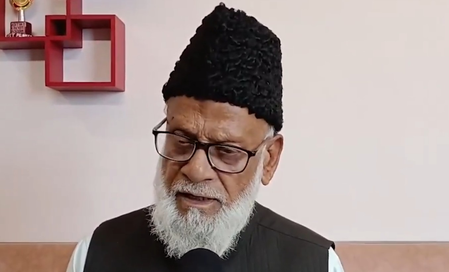New Delhi: The latest updates in the Class 8 Social Science textbook released by the National Council of Educational Research and Training (NCERT) have ignited a fresh wave of controversy across India, drawing sharp criticism from several Muslim clerics while receiving support from Sikh leadership.
The revised textbook, now titled ‘Reshaping India’s Political Map’, revisits medieval Indian history with added emphasis on the Delhi Sultanate, the Vijayanagara Empire, the Mughal era, and the emergence of Sikh power between the 13th and 17th centuries. Unlike previous editions, the updated version now highlights instances of political unrest, military conquests, temple desecration, and religious intolerance under the Sultanate and Mughal rule.
Muslim Clerics Condemn Revisions
Several Islamic scholars and clerics have voiced serious concerns over what they term a “distortion of history.”
Mohammad Suleman, founding member of the All India Muslim Personal Law Board (AIMPLB), strongly criticised the changes, alleging that the ruling powers are manipulating history to fit a political narrative.
“Those in power, regardless of organisation or ideology, are distorting history. It’s no longer a secret. A progressive society can only grow when history is presented in its true context,” he told IANS.
Suleman also accused the establishment of weakening respected academic institutions such as the Indian History Congress. “These people are not contributing to the country; they are harming it. When international scholars examine Indian history, they will still note rulers like Aurangzeb, even if he ruled by the sword. They’ve even altered narratives surrounding Babur. In truth, it was Rana Sangha, an Indian king, who invited Babur. Whether he was cruel or not, that’s for historians to interpret, not to erase,” he added.
Echoing these sentiments, Maulana Nisar Ahmad Misbahi, a cleric from Unnao, said, “History should reflect the truth—no forced glorification, no forced defamation. Presenting a distorted version of events only poisons the minds of future generations and disturbs communal harmony.”
Sikh Cleric Welcomes the Move
In stark contrast, Sikh religious leaders have welcomed the NCERT’s new approach. Jagdip Singh Kahlon, General Secretary of the Delhi Sikh Gurdwara Management Committee (DSGMC), hailed the revisions as a long-overdue acknowledgment of historical truths that have been ignored or softened for decades.
“This is the right decision. The Mughal rulers committed severe atrocities. Guru Arjan Dev Ji, Guru Tegh Bahadur Sahib Ji, and the sons of Guru Gobind Singh Ji were all martyred under Mughal tyranny,” Kahlon said in a statement to IANS.
He criticised the post-independence narrative that glorified Mughal rulers. “It is shameful that those who executed our Gurus and destroyed temples were given such prominence in our history. Roads, institutions, and cities were named after them. Our youth must know what really happened. If these syllabus changes help reveal that truth, then I fully support them.”
Controversial Additions
One of the new textbook inclusions describes Alauddin Khilji’s general, Malik Kafur, and his invasions of several important Hindu pilgrimage centres including Srirangam, Madurai, Chidambaram and possibly Rameswaram.
Another controversial section claims that the Delhi Sultanate period saw “numerous attacks on sacred or revered images in Buddhist, Jain and Hindu temples,” and asserts that these acts were driven not only by a quest for wealth but also by religious iconoclasm.
These insertions, while welcomed by some as corrections to what they call whitewashed history, have raised concerns about the potential communal impact of such narratives, especially among India’s religious minorities.
The Debate Beyond Classrooms
The debate over historical representation in textbooks is not new in India, but it has become increasingly politicised in recent years. Educational institutions, under various governments, have seen changes in curriculum designed to reflect differing ideologies.
While proponents argue that the changes bring historical balance and truth to the forefront, critics warn of selective portrayal and communal polarisation.
Historians, too, are divided. Some argue that acknowledging uncomfortable truths is essential to historical integrity. Others caution that textbook revisions should be handled with scholarly consensus and not political expediency.
A Call for Balanced Discourse
As the textbook controversy continues, educators, parents, and policymakers are left grappling with a larger question: How should India’s diverse and complex history be taught to its children?
“Education should not become a battlefield for ideologies,” said Dr. Meher Fatima, a history professor at a Delhi university. “We must strive for an inclusive, honest, and balanced approach to history—one that informs without inciting.”
The NCERT, meanwhile, has not responded to the criticism directly but maintains that the new curriculum is designed to align with the National Education Policy (NEP) 2020, which aims to promote critical thinking and contextual learning.
For now, classrooms across the country may soon become the latest front in an ongoing debate about India’s past—and its future.


